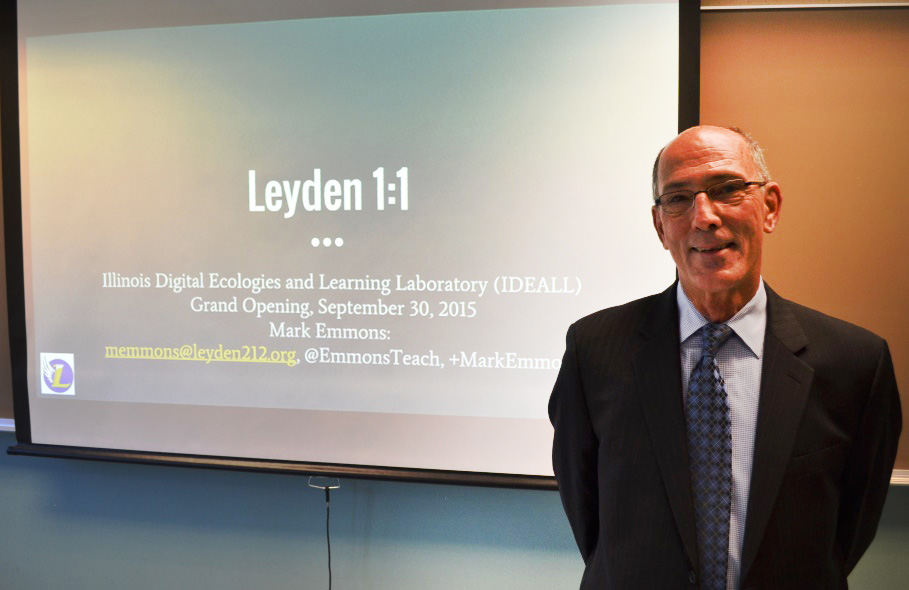Education online graduate helping transform learning at East Leyden High School
by Sal Nudo / Oct 13, 2015

Alumnus Mark Emmons gives tech talk, prior to grand opening of College’s innovative data-collecting lab
Mark Emmons became a high school teacher at a later age than many who begin in the profession, but his skills as an educator were honed while working in the corporate world for 25 years.
From the mid-1980s through 2000, Emmons, who received his master’s degree in the College’s former curriculum technology and education reform (CTER) online program, was a principal/officer of Dearborn Financial Publishing Inc. and later a vice president at Dearborn/Kaplan Professional. In charge of product development, his responsibilities partly revolved around technology integration and systems development.
Emmons’ love of technology eventually integrated with a surprising new profession: teaching high school students. After earning his secondary education degree at DePaul University, he took the plunge and began teaching economics and sociology at East Leyden High School in Franklin Park, Illinois, where he has been for more than 10 years.
“I just had a blast,” said the 63-year-old Emmons. “I found it so enjoyable after 25 years in the corporate world … I really think I did make a difference.”
Emmons' love of technology eventually integrated with a surprising new profession: teaching high school students.
Now a technology coach at East Leyden, Emmons returned to the College of Education at Illinois on Sept. 30 to give a talk to interested faculty and graduate students on teaching in the 1:1 computing environment, which his high school has done now for four years. In a nutshell, 1:1 teaching at Leyden entails curriculum optimized via Google Apps for Education, with students using the Chromebook appliance. The school partnered with several vendors, including Dell, with a simple mission statement in mind: Why should the only place where students are disconnected be at school?
East Leyden has approximately 3,500 students, 50 percent of whom are Hispanic. Emmons said a significant number of East Leyden students hail from eastern European countries, and that 35 percent of students qualify for free or reduced lunches. He said the school is not located in a wealthy district, but the school board pursued the ambitious 1:1 environment anyway. The board, Emmons said, collectively did what it felt was best for the students.
“We have an enlightened administration that is willing to take a risk to provide the best opportunities for our kids,” he said. “You can be as safe as you want, but then nothing happens.”
As a first-year business education teacher at East Leyden, Megan Doherty said there is a steep learning curve incorporating 1:1 teaching technology with Chromebooks, while making sure to work on the required curriculum. Still, she believes students who have access to such tools acquire more real-world, hands-on experiences in comparison to the more traditional “paper, pencil, sitting at a desk type of experience.”
“I think giving them the experience with the technology will help them when they move on to either college or corporate because everything uses technology,” said Doherty, who utilizes Emmons’ technological expertise in her classroom.
Emmons said many East Leyden students do not pursue college after senior year, but a large number of them who work in the school’s technology support internship are recruited to customer- and related technical-support positions in the Chicagoland area immediately after graduating.
“It’s an exceptional feeling to have a high school senior walk right into a job,” he said.
Innovation at Illinois
Emmons believes the Illinois Digital Ecologies and Learning Laboratory (IDEALL), housed in the Education Building, is a space that “is at the right place at the right time.” IDEALL is a research laboratory that enables scholars to study learner interactions with digital technologies in real time, while collecting massive amounts of varied data.
“We really do need to look at what does a mobile environment for learning mean to learning?” Emmons said. “What does the implementation of certain technologies mean for learning? Until we have some solid answers, frankly, that’s always been the excuse: ‘Well, prove to me that technology improves X.’ It’s a simple dodge, and it’s preventing many school districts from moving forward.”
One of his peers who would likely agree with that view is Katie Diebold, who graduated with Emmons from the College’s same online program. She is now an instructional technology coach at York Community High School and worked as a liaison with Emmons as East Leyden implemented its 1:1 technology.
Diebold said her master’s degree taught her how to use technology to extend her students’ learning and sparked her passion for learning and connecting with others.
“I started building my personal learning network during the course and am thankful today for those connections,” she said.
Emmons is also grateful for his Education degree, which he earned at a time when he had application experience but not enough academic experience in the technology realm. He said technology cannot be implemented without thoroughly thinking through all components—“how we think about what we think about” in his words.
“From that standpoint,” Emmons said, “I think the education I received at the U of I was a capstone, rounding out what was missing in my portfolio.”
Interested in preparing educators to better understand technology and how to use it in the classroom or workplace, similar to Mark Emmons? We offer a Technology Specialist program in which students learn about emerging technologies and their implications on teaching and learning. Discover more…